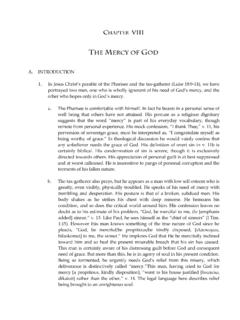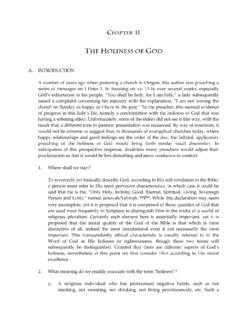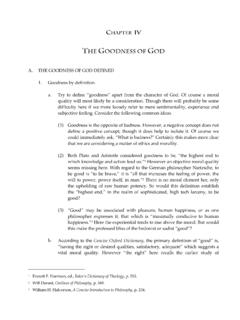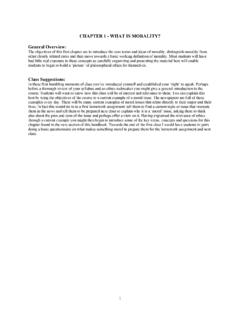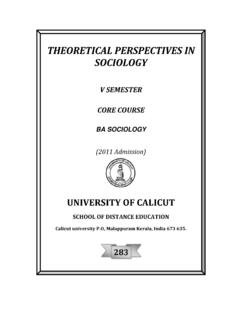Transcription of 01 John I The Prologue Ministry of Jesus Christ
1 CHAPTER I THE Prologue Ministry OF Jesus Christ John 1:1-18 HE Prologue of the Gospel of John is profoundly and gloriously theological, and while the suggestion may come to mind that it would be better to quickly move on to the more simple narrative chapters, especially when presenting this truth to an unbeliever or even an immature Christian, yet this temptation is to be resisted at all costs. If it be agreed that John 1:19-12:50 is designed to present Jesus Christ as the personal object of saving faith, then it needs to be appreciated that John 1:1-18 intentionally qualifies, in elevated terms, the full dimensions of this same saving person.
2 In other words, before we reach such evangelistic overtures as John 3:16 in which the universal offer of Jesus Christ is plainly described, we need to be clear about who this Jesus Christ is in exact terms, and such a vital explanation is given in John 1:1-18. A. THE ETERNAL WORD AND HIS RELATIONSHIP TO GOD, 1:1-2 The incorporation of the teaching of Genesis 1-3 into the commencement of John s Gospel is probably more substantial than a casual reading might reveal. To begin with, John s orderly description of beginning, vs. 1-2, God, vs. 1-2, came into being, v. 3, life, v.
3 4, light, vs. 4-5, 7-9, darkness, v. 5, man, vs. 6, 9, very much parallels similar terminology in Genesis 1:1-31. Also consider that the Prologue includes the revelation of God on earth, vs. 14, 18, sin, v. 10, and grace, vs. 16-17. So Genesis likewise describes God as present on earth, 3:8-9, sin, 3:1-7, and grace, 3:15. The acknowledgment of this pervasive Hebrew setting is significant insofar as an understanding of the particulars of the Prologue is concerned. However, the parallel here with regard to Genesis must also be understood as climactic since John adds dimensions that transcend time and transport us into eternity.
4 Thus Westcott rightly explains that Moses dwells on that which starts from the point, and traces the record of divine action from the beginning (I John 1:1; 2:13), while St. John lifts our thoughts beyond the beginning and dwells on that which was when time, and with time finite being, began its course (cf. Prov. 8:23). 1 1. The eternal preexistence of Jesus Christ with God, v. 1a. In the beginning, the Word was existing, En arche e n ho logos. Isaac Watts has penned this truth as follows: Ere the blue heavens were stretched abroad, From everlasting was the Word: With God he was; the Word was God, And must divinely be adored.
5 1 B. F. Westcott, The Gospel According to St. John, p. 2. T AN OUTLINED COMMENTARY ON JOHN 2 a. The beginning. What beginning? The beginning of creation according to Genesis 1:1 when God was gloriously existing along with His Son (the Word), 17:5, from eternity past. The second person of the Trinity did not merely exist, but he began the beginning. b. The Logos. Who then is the Word ? Clearly vs. 14 identifies it as Jesus Christ who John beheld and touched, I John 1:1. Then where does this terminology come from?. The word logos has many meanings, and more liberal exegetes have associated it with Greek Platonic and Stoic philosophy, particularly prevalent in Alexandria; such understanding of the logos comprehended the supreme creative principle, reason, the impersonal soul of the However, John is far more influenced by the Old Testament, as already indicated, where his logos is not detached from the world, but part of it, and for this reason the Word here draws upon several passages.
6 Also consider that Jesus of Nazareth is also elsewhere designated as the word (Luke 1:2). In Ps. 33:6, By the Word of the LORD the heavens were made. In Prov. 8:22-30, especially v. 23, wisdom is personified and also, like Christ , has existence before creation. So in I Corinthians 1:24, Paul describes Christ as the wisdom of God. In Heb. 1:1-3a, God in these last days has spoken to us in His Son. Hence Logos here means the self-expression of God which came by active word, but now flesh. Jesus is Christ s earthly name (Matt. 1:21), while the Word is his eternal name. c. The preexistence.
7 The imperfect tense here of the verb to be, , e imi, in contrast with the aorist of , ginomai, in vs. 3, 6, stresses continuous action in the past. Christ (the Word) existed eternally before and at creation, hence he was not created. This eternal preexistence was not incarnation but eternal sonship manifest as the only begotten from the Father, v. 14, or unique Son of God, the first born (Col. 1:15), the chief or first in rank. 2. The intimate position of Jesus Christ with God, v. 1b. And the Word was [being] intimately before God, kai ho logos e n pros ton logon.
8 Literally Christ (the Word) was, again imperfect tense, facing God, or as v. 18 describes, in the bosom of the Father, which he reveals in 17:5 as an exquisitely glorious and transcendently blissful relationship. Here economic relations within the Trinity take on emotional and not merely rational dimensions. 2 For a thorough refutation of this concept of a secular source, refer to Leon Morris, The Gospel According to John, , 115-26, also Carl Henry, God, Revelation and Authority, II, pp. 11-12. THE Prologue Jesus Christ THE ETERNAL WORD OF GOD 33.
9 The essential nature of Jesus Christ as that of God, v. 1c. And the Word was [being] God. , kai theos e n ho logos. Again the imperfect tense indicates eternal existence. However, the preceding high relationship is qualified so that Christ being face-to-face with the Father is but indicative of the fact of his essential Deity. Hence, the Word was God, and not divine, and certainly not a god according to Jehovah s Witnesses. A. The deity of Christ defended. For those who have no knowledge of Greek, a simple rebuttal of the Jehovah s Witness runs as follows.
10 The claim is made that the Greek here has no definite article or the, so that a god is more literally correct. However there is no indefinite article or a in Greek! Nevertheless, enquire if a passage of Scripture that clearly addresses Jesus as the God were revealed, then would not Jesus deity be established? Refer to John 20:28 where Thomas confesses Jesus to be, literally, the Lord of me and the God of me, , ho kurios mou kai ho theos mou, with the use of the definite article. F. F. Bruce has written: Those people who emphasize that the true rendering of the last clause of John 1:1 is the word was a god, prove nothing thereby save their ignorance of Greek grammar.
